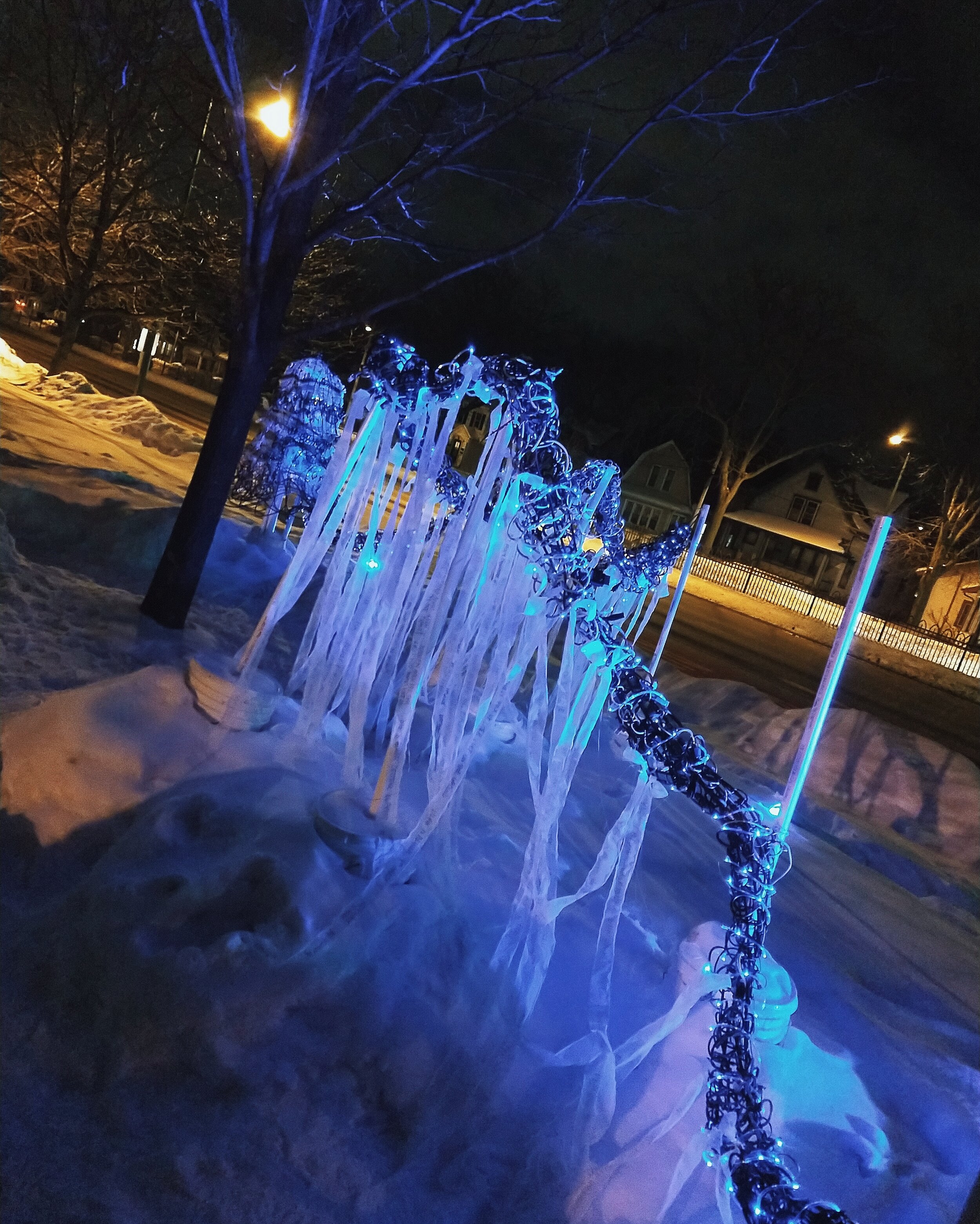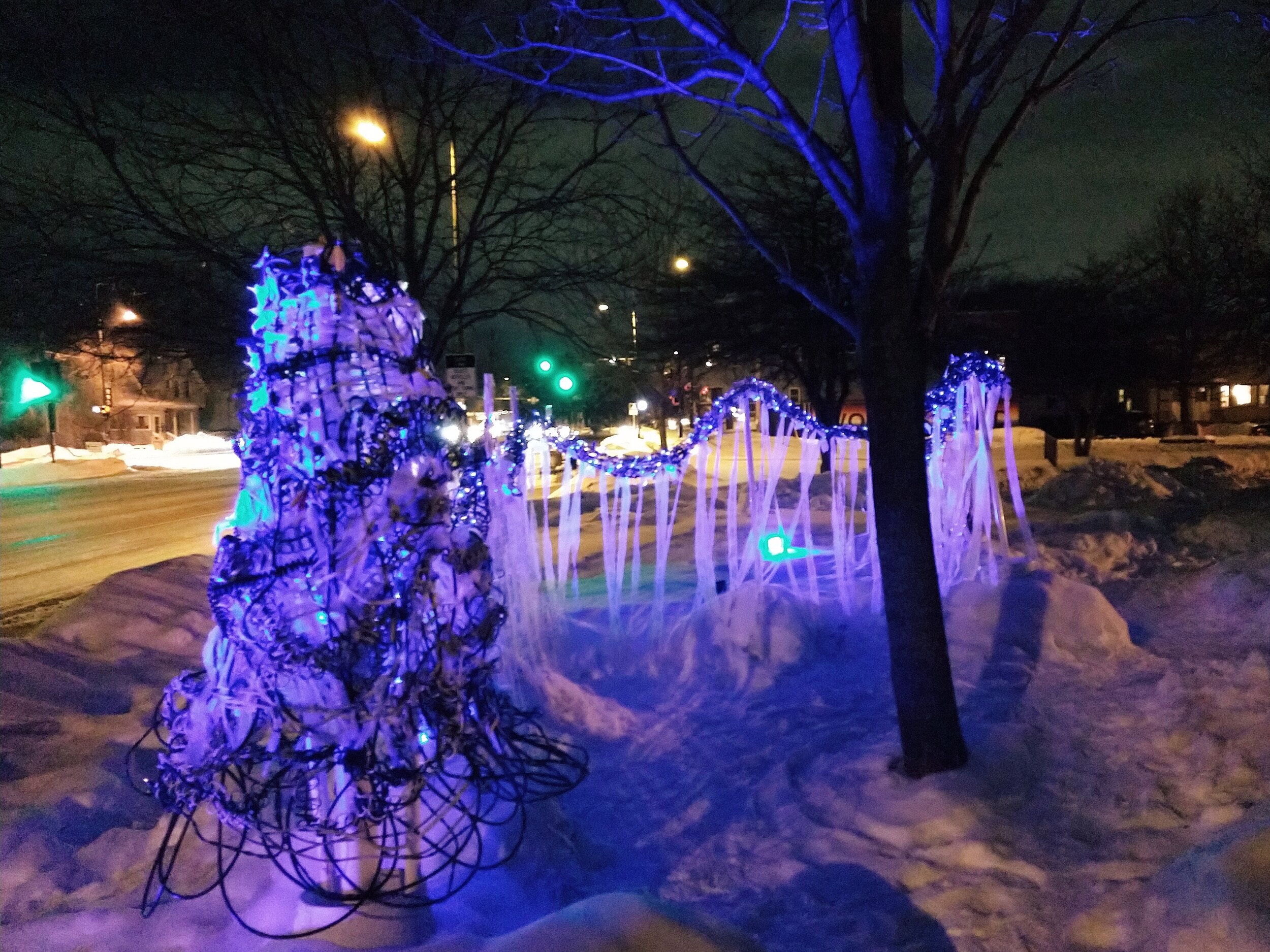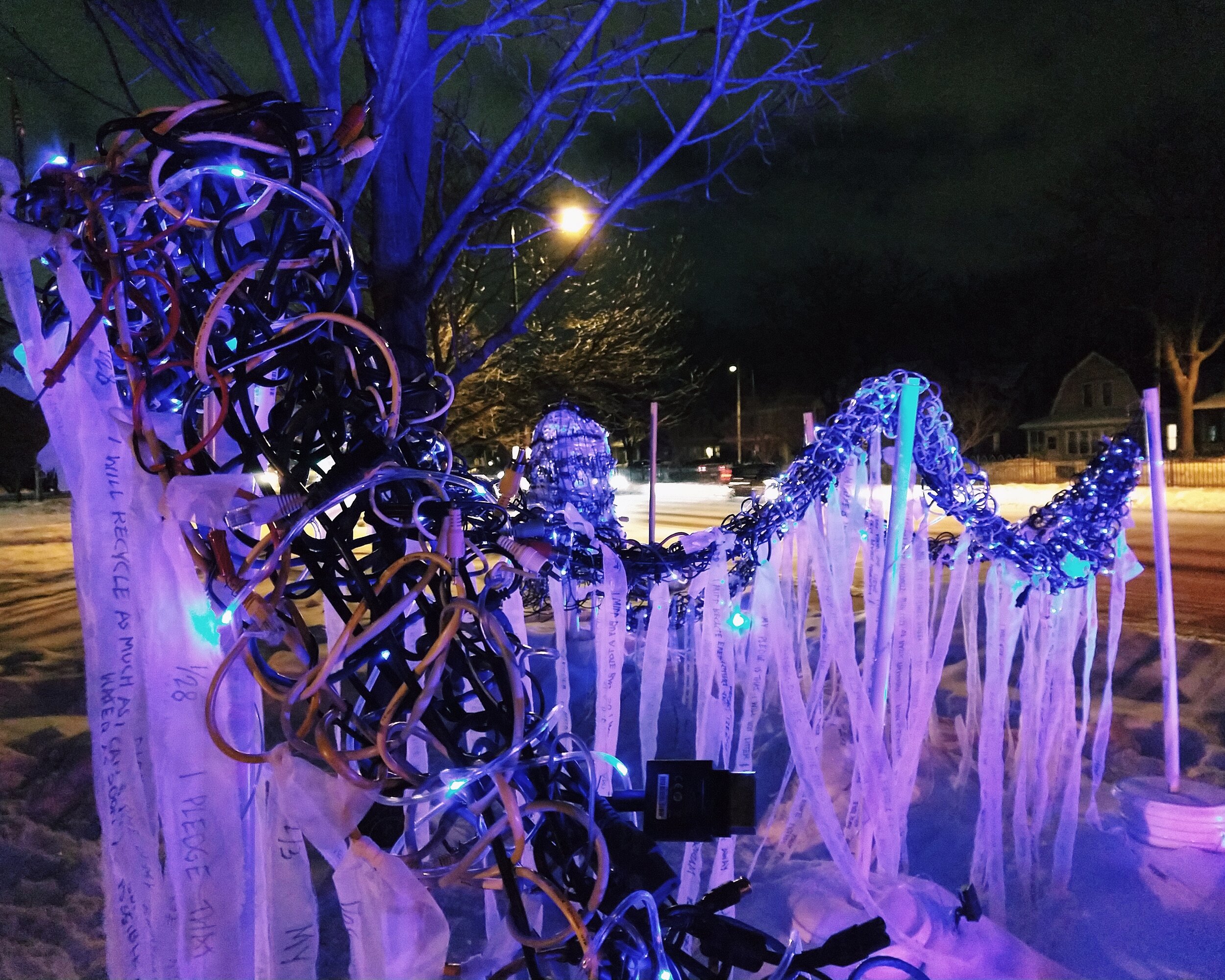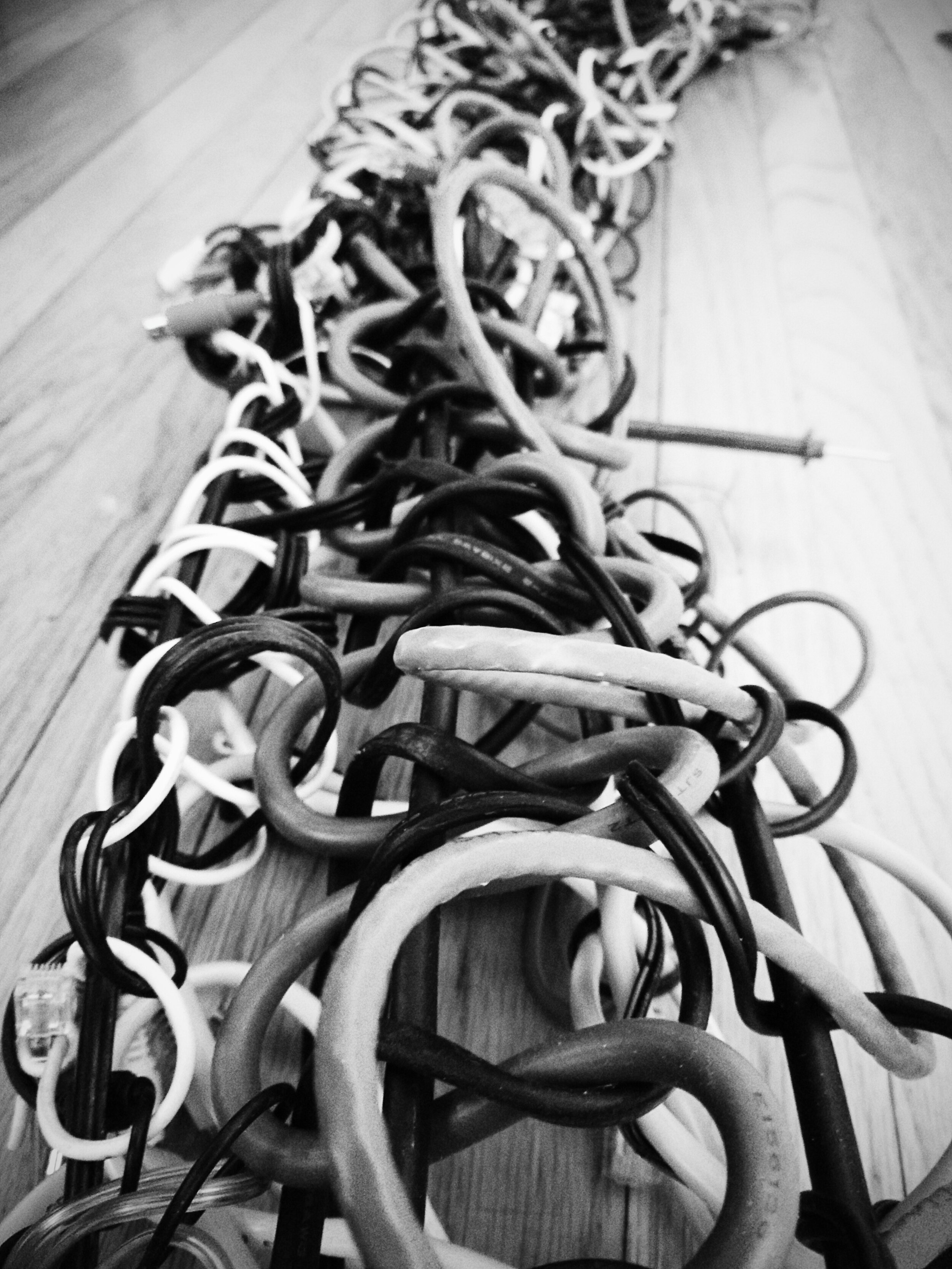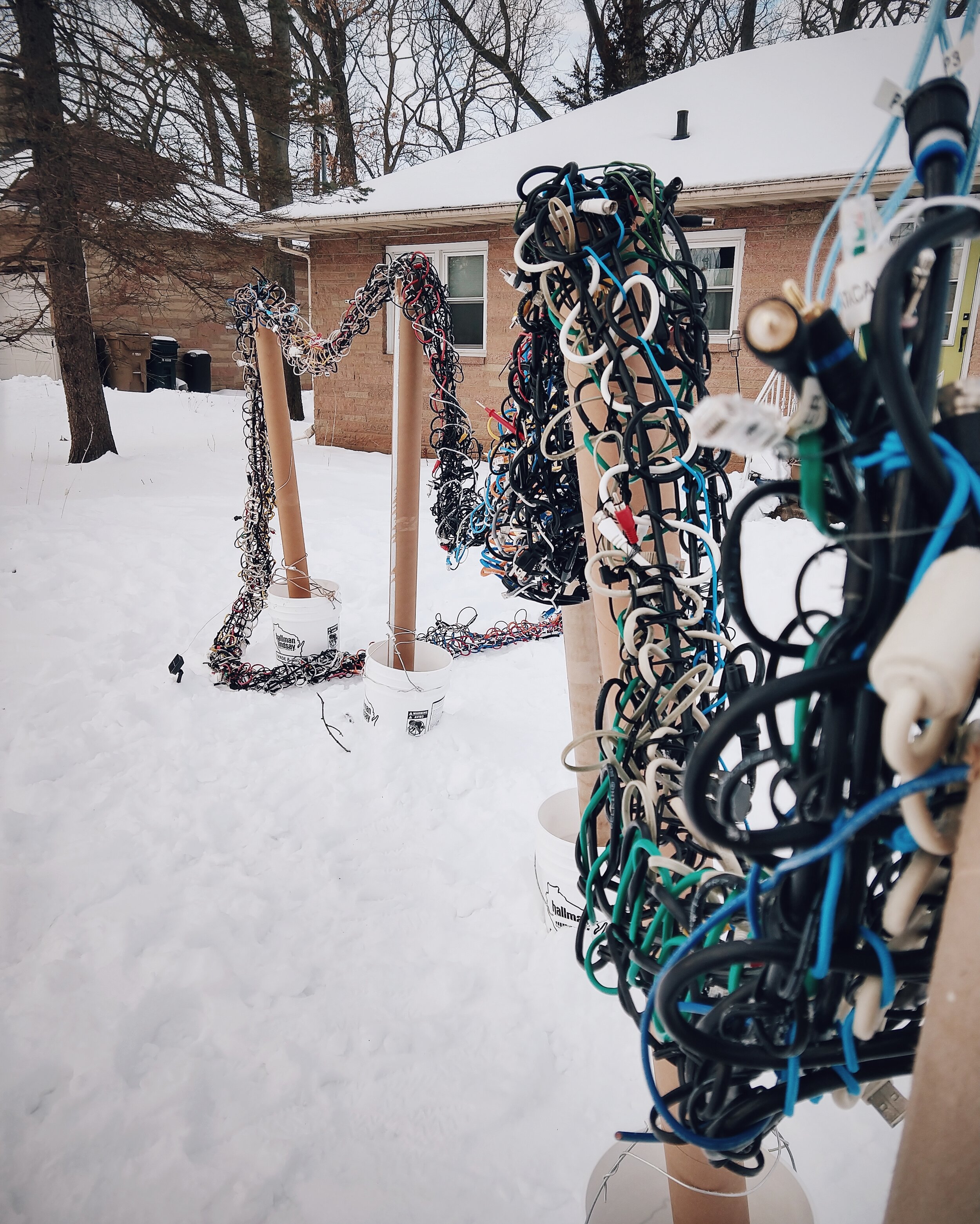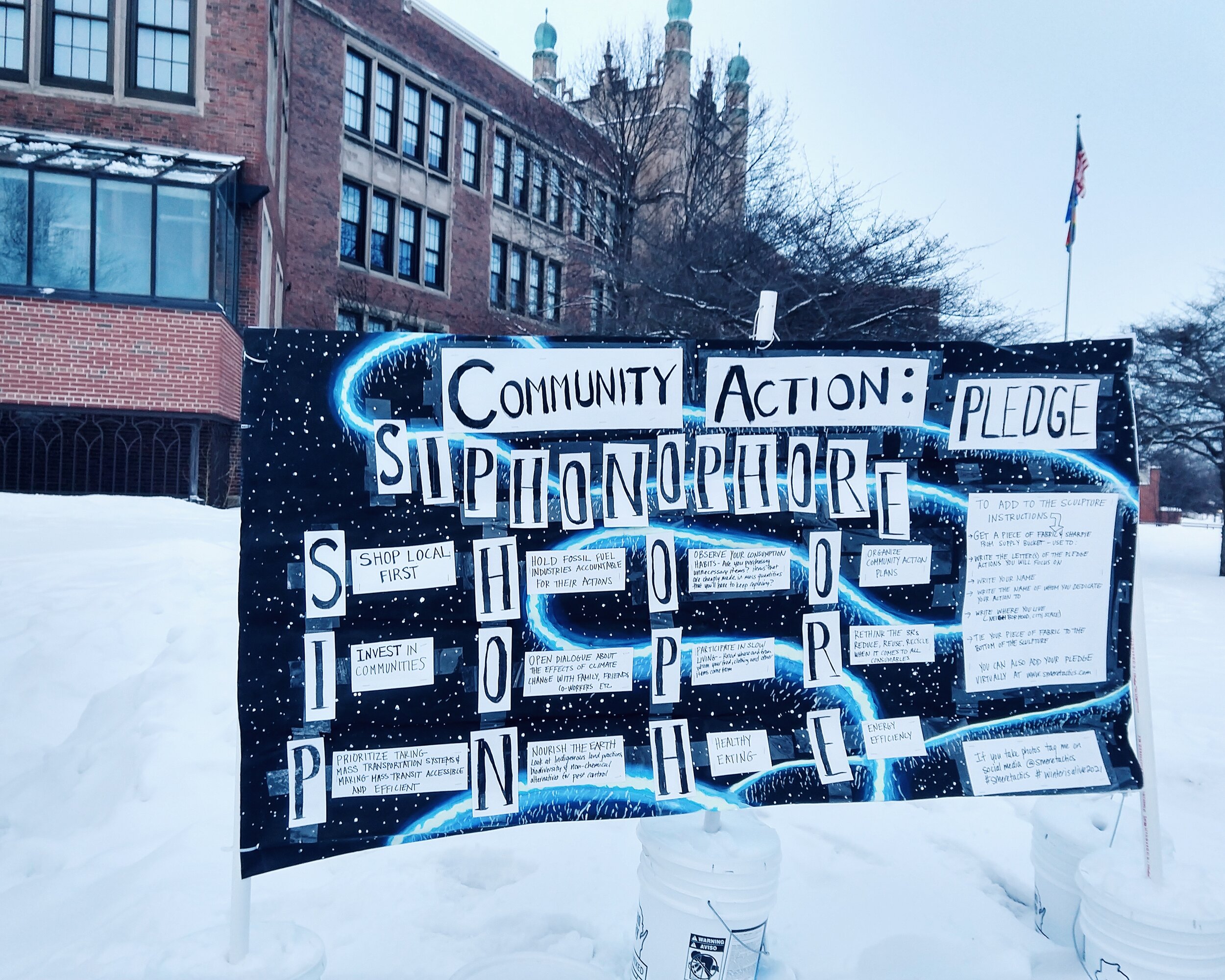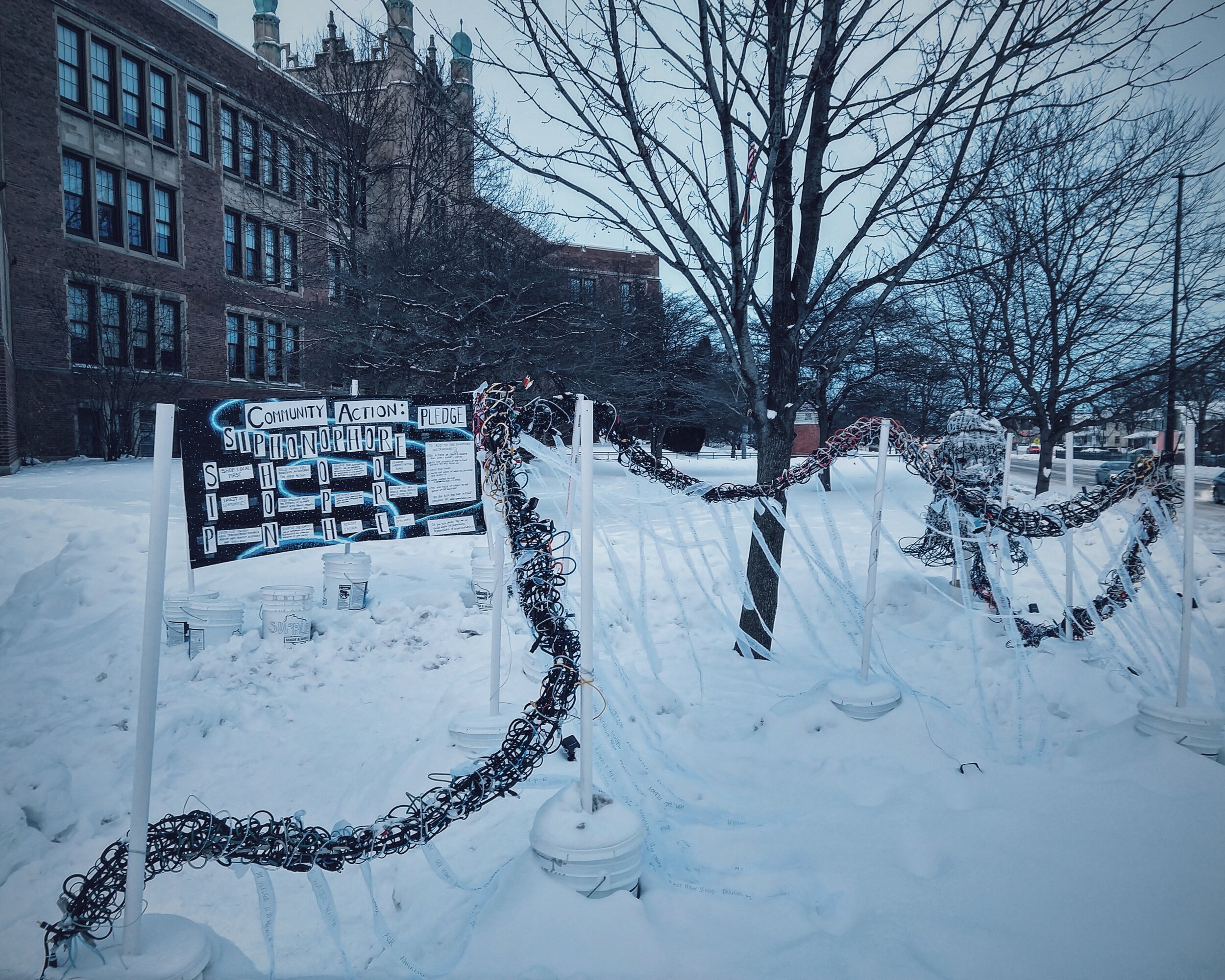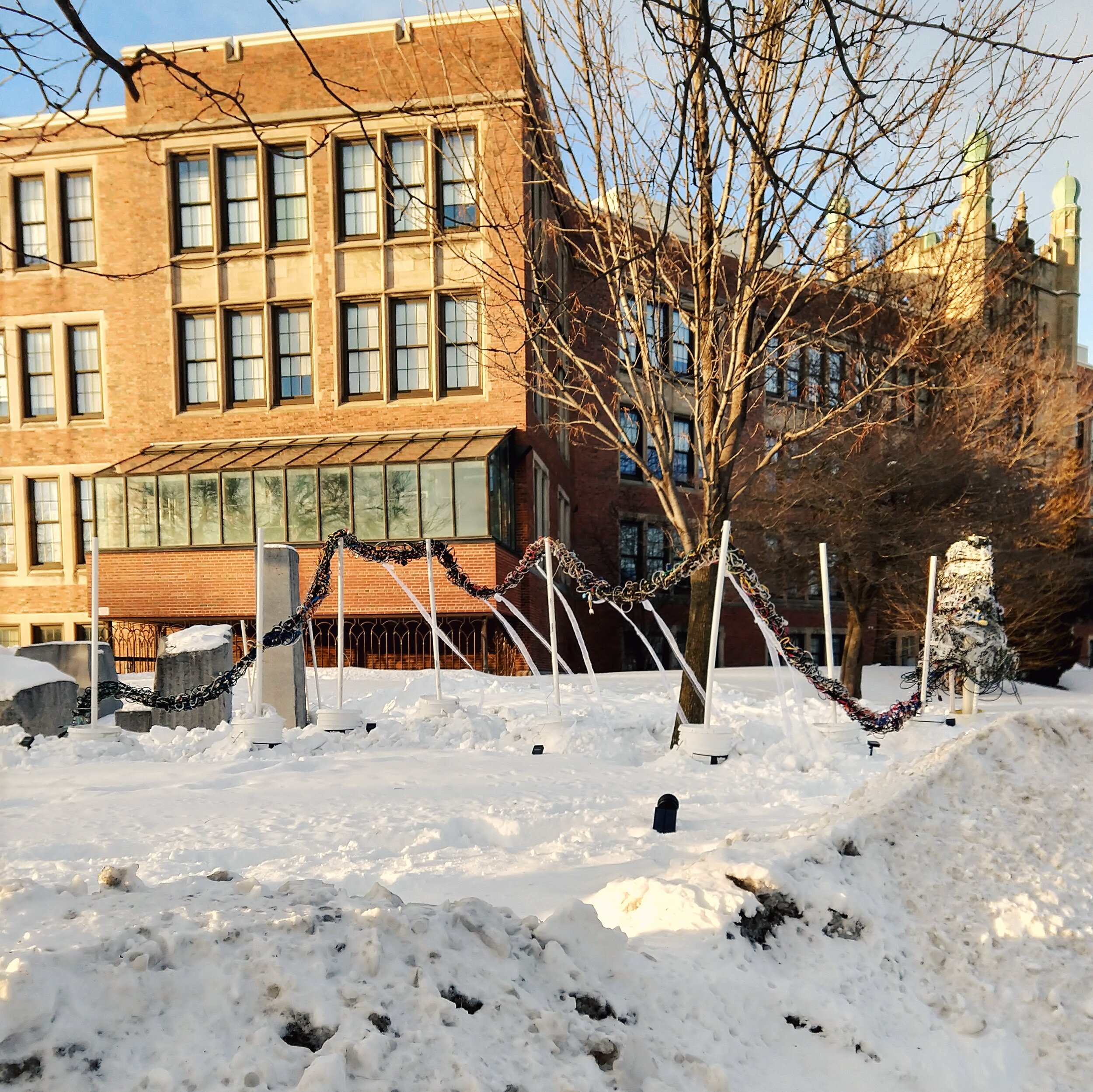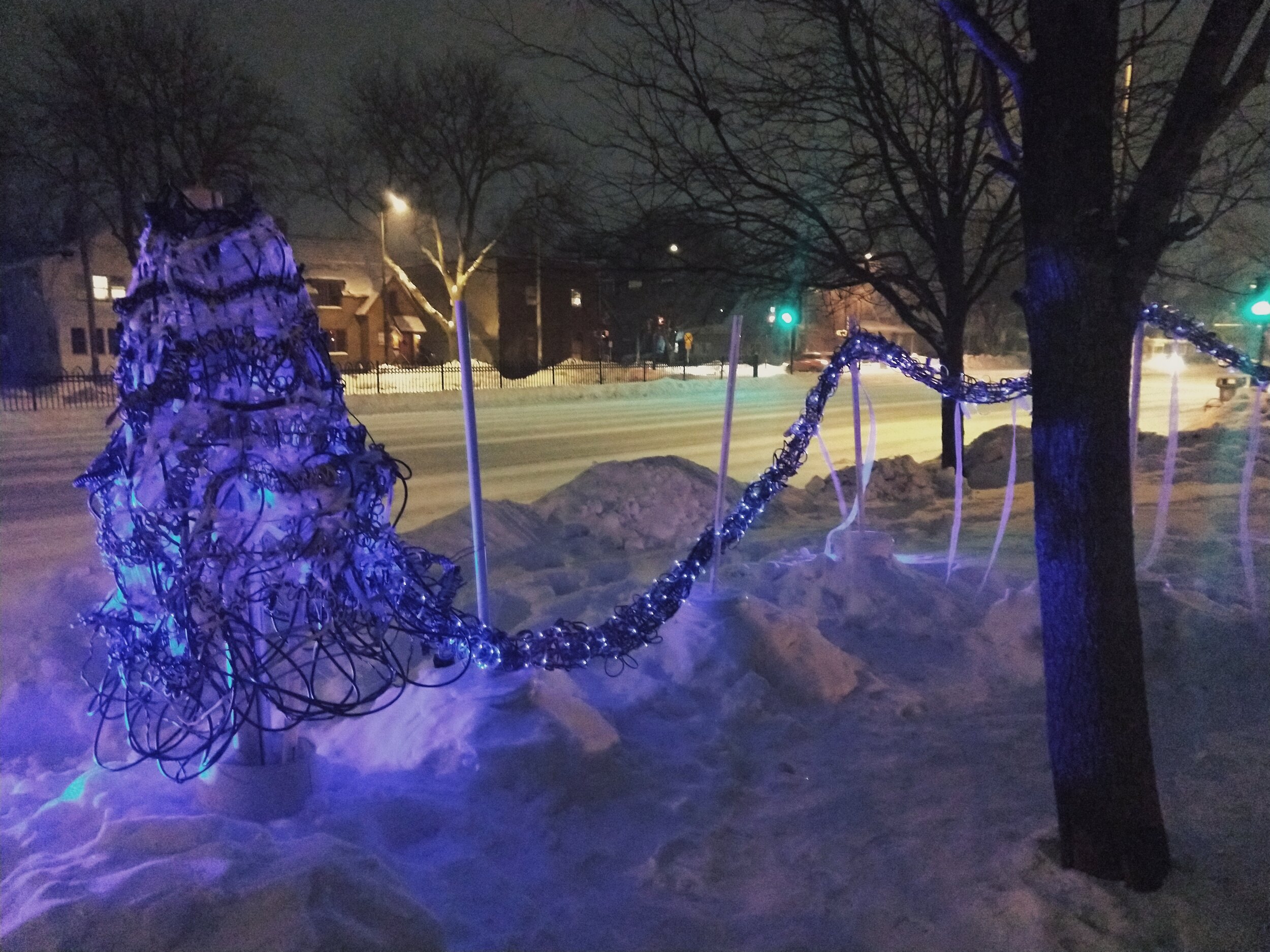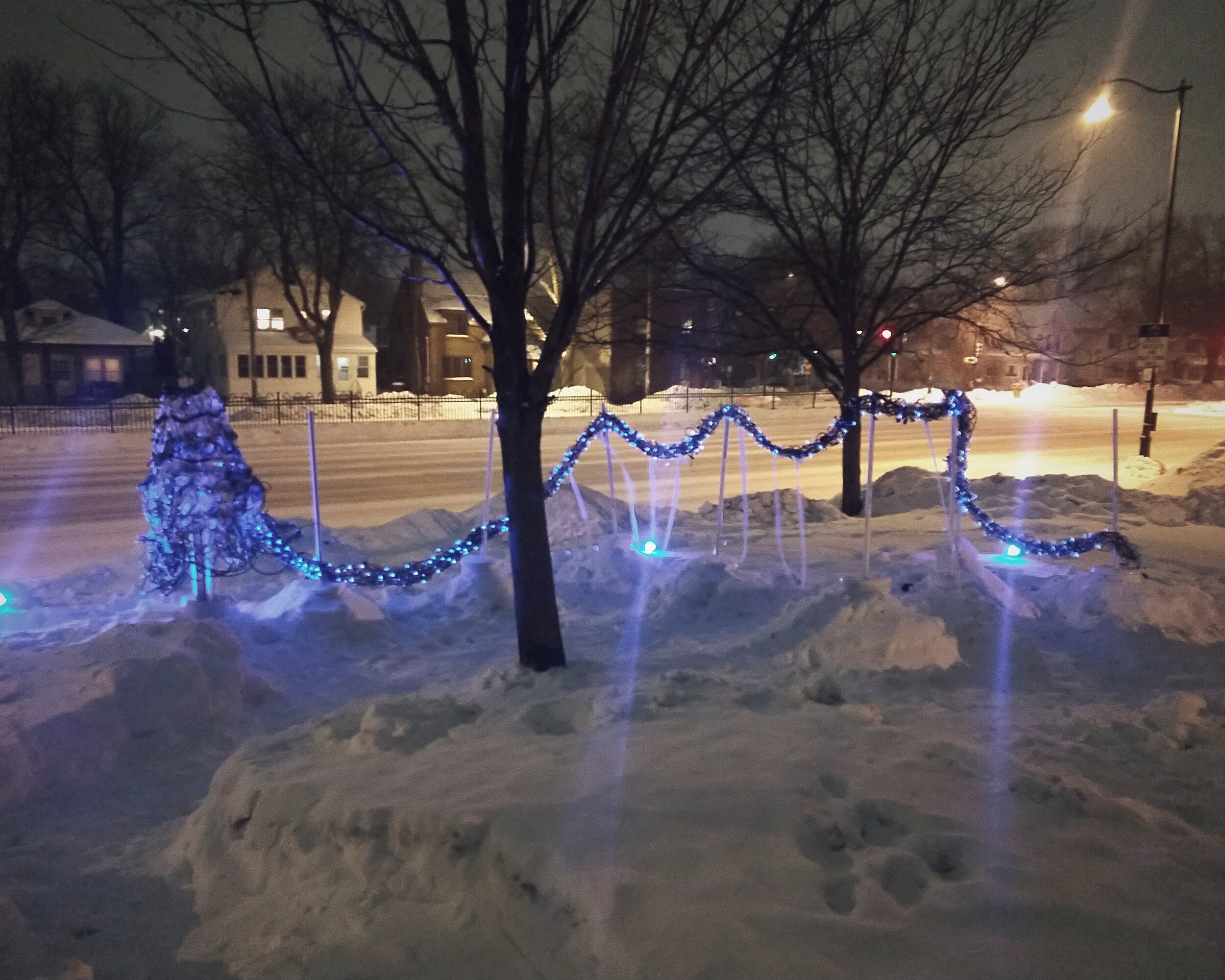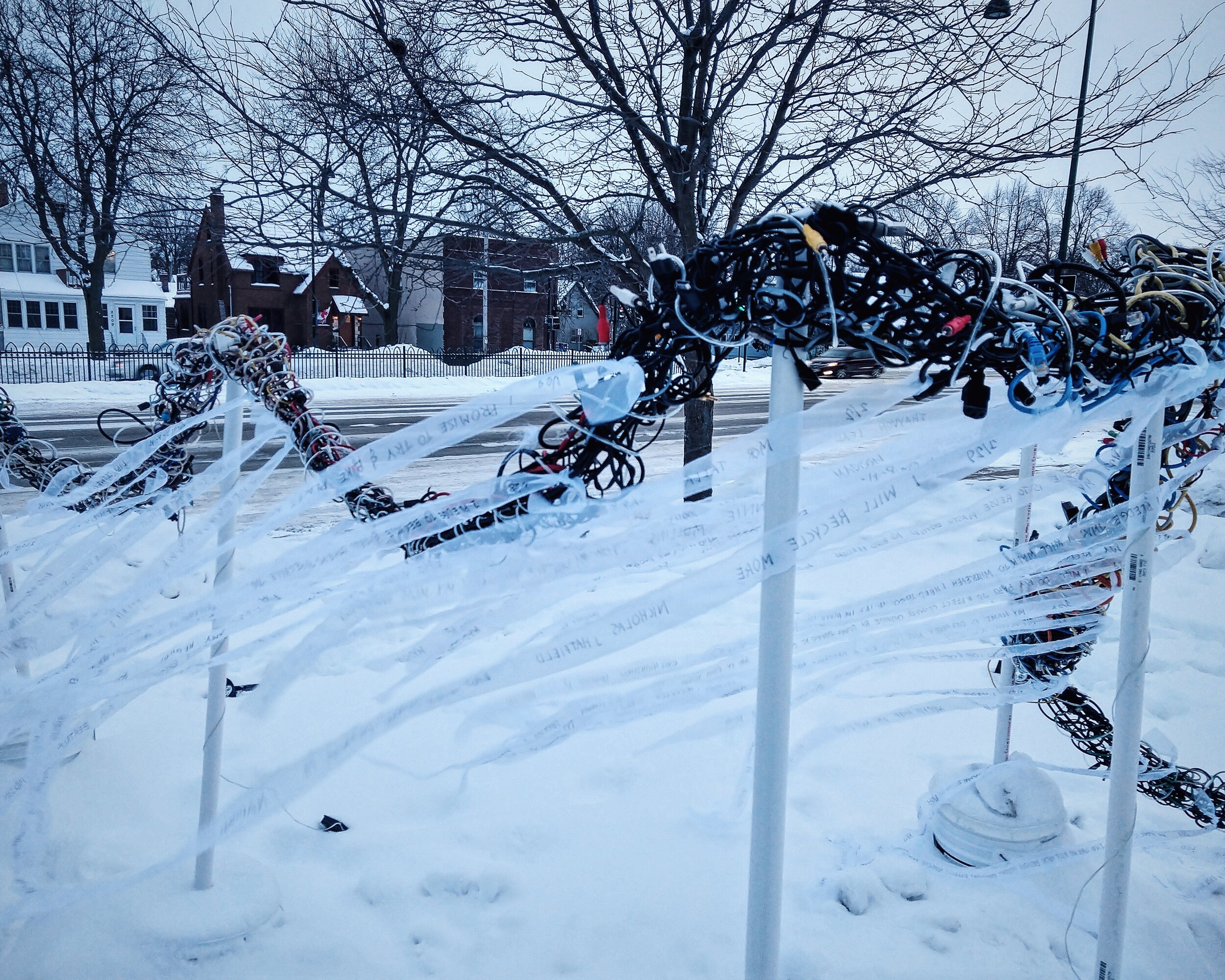Community Organism & Community Action Pledge
Giant Siphonophore- Praya Dubia - A deep sea invertebrate comprised of many individual organisms called zooids that cannot survive without the colony they are a part of.
What you should know
I was one of many artists chosen to create work for Winter is Alive! a cooler world carnival a multi-disciplinary event fusing art and spectacle to revision climate change and activate global relationship.
My work for this is both a sculpture and a social practice. You can view the sculpture of a giant siphonophore on the front of the East High School Lawn from Feb 12- March 7 ( installation photos will be added here as well)
I am collaborating with East High art Students to present the actions they will take to fight climate change and presenting their pledges ( with permission) at some point during the month
A siphonophore is A deep sea invertebrate comprised of many individual organisms called zooids that cannot survive without the colony they are a part of. Just as these organisms depend on each other for survival we also depend on individual and varied roles to fight against climate change. This creature serves as a natural metaphor for what humans can strive toward together as a community. There are a myriad of ways that we each can contribute to global climate action and they are all important.
The siphonophore sculpture is made almost entirely of repurposed materials including various cords, wire, cardboard cores, sheer fabric and used 5 gallon buckets. These materials were sourced locally from this amazing group of people. The materials that purchased new are solar lights so you can view the sculpture at night and water softener salt ( an appropriate weight that has a use afterward)
I invite everyone to take the Community Action Pledge listed below that highlight categories of broad actions that we can take to combat climate change.
Because I am a huge nerd these actions correlate to the acronym SIPHONOPHORE a reminder that even if you choose to focus on one broad category you are contributing to a larger movement. There is a list of resources broken down by category to elaborate on each broad action with why it matters, action suggestions, as well as links to helpful articles, podcasts and organizations. This list is a resource, only you can decide what actions are right for you to take . These actions may look different than this list and that is totally great!
Your Pledge, Your Name , Name of person you dedicate to will be written on a strip of fabric and tied on to the siphonophore sculpture when you select the action(s) you will take and sign the pledge your name and the name of a loved one you are dedicating your pledge to. These fabric piece represent the feeding tentacles of the siphonophore AND help sustain the movement of the global community of people who are fighting climate change. A list of people who have taken the pledge will also be added here. Scroll down to take the pledge and view the resources!
Thank you for fighting climate change with us!
Resources
Know that every single journey will look different. Don’t judge people for doing more or less than you. What is sustainable for some (ex. zero waste) will not be possible for others and that doesn’t mean they aren’t making changes in ways that make sense for them.
This list of resources is not comprehensive and should not keep you from taking your own course of action(s) in combating climate change. Do what makes sense for you and your family as long as it doesn’t have a disproportionate negative affect on other people.
Resource Index/ Jump to Section
P-Prioritize taking mass transportation systems & making mass transit accessible
H- Hold fossil fuel industries accountable for their actions
O- Open dialogue about the effects of climate change with family, friends, co-workers, etc.
O- Observe your consumption habits
O- Organize community action plans
R- Rethink the 3Rs (Reduce, Reuse, Recycle) when it comes to all consumables
S- Shop local first
Why- Some reasons to buy locally:
Your purchases come from your community reducing the amount of miles those items had to travel to get to you
The businesses are smaller and more accessible (many times you can walk/bike there)
Small businesses rely on local workers
Supporting local farmers reduces the amount of land that gets developed
Action Suggestions:
Ask yourself if there is a local business where you can find what you need before you go to a commercial, department or big box store or Amazon
Ask your friends/ family/ other locals for recommendations of service providers or their favorite local place for x ( any item you are looking for)
Explore your community
Keep local businesses in mind when you are purchasing gifts
Articles:
: Does it Really Matter if We Buy Local?
The Environmental Benefits of Buying Locally
How to Search for Items and Shops on Etsy
Organizations:
Madison Resources:
I- Invest in community
Why invest in the community? :
“Becoming more resilient – anticipating and addressing community threats – not only holds the potential to save lives – and billions in recovery dollars and economic losses – it also encourages social equity and connectedness, fostering communities that grow and recover in ways that make them stronger than before.” - Institute for Sustainable Communities
Investment means more than monetary contributions, it also refers to what you pay attention to, and what you show up for, share, volunteer or advocate for.
Action Suggestions:
Volunteer with local organizations:
That are youth- led
Working with low income neighborhood
Working on social justice issues
Purchase items when part of the proceeds benefit a cause
Get to know your neighbors
Articles:
10 ways to invest in community
53 Ways to Impact Your Community Every Day
Podcasts:
Organizations:
Institute for Sustainable Communities
Intersectional Environmentalism
Youth Led Orgs
SustainUS: U.S. Youth for Justice and Sustainability
International Youth Climate Movement
International Eco-Hero Awards (Action for Nature)
ECO2school youth leadership program
P- Prioritize taking mass transportation systems & making mass transit accessible and efficient
Why is mass transit important?
“public transportation produces fewer per person emissions than private car travel”- Ethan Jasny Making public transportation more accessible and efficient means less reliability on individual vehicles and less suburban sprawl that affects wildlife and natural areas
Action Suggestions:
Ask elected officials to work toward more efficient mass transportation systems that are accessible to people in urban and suburban areas ( see Plymouth, Minnesota for an example of a city innovating their transportation system)
Advocate for city development around already existing transportation hubs and stops
If it’s possible, take public transportation available in your area, bike or walk.
If you can’t get by without a vehicle:
Carpool
Run errands in one day
Find resources closer to where you live if possible
Articles:
Why We Need Public Transport to Fight Climate Change
CIVITAS- Cleaner and Better Transport in Cities pdf
Sustainable Transit is about much more than saving the environment
Podcasts:
Organizations:
Transportation for America- Fight for your Ride
American Public Transportation Association - Wisconsin links
H- Hold fossil fuel Industries accountable for their actions
Why do fossil fuel industries need to be accountable?
For decades the fossil fuel industry has funded climate deception instead of working on ways to lower their impact on the environment. It was in their best interest to deny climate change to protect their profits. They are the single largest industry to impact climate change.
“In 2018, 89% of global CO2 emissions came from fossil fuels and industry.”- Client Earth
“only 100 investor and state-owned fossil fuel companies are responsible for around 70 percent of the world’s historical GHG ( Greenhouse gas) emissions.” Elliott Hyman Harvard Political Review
Action suggestions:
Know which of your representatives/ state/ local politicians receive money from fossil fuel industries. If this impacts which legislation they propose/ support stop supporting them instead...
Support candidates that back clean energy
Ask elected officials and fossil fuel companies to make these changes from Union of Concerned Scientists:
“These companies should immediately stop funding climate deception. They should bear their fair share of responsibility for the damage caused by their products.
Reject disinformation on climate, including through their trade associations and other lobbying groups; they should also publicly disassociate themselves from such groups and their activities.
Support sensible climate policies to reduce global warming emissions.
Fully disclose the financial and physical risks of climate change to their business operations.
Align their business models with a carbon-constrained world consistent with keeping warming well below a 2°C increase above pre-industrial levels, as agreed by world leaders.
Pay for their share of the costs of climate-related damages and climate change adaptation. Carbon taxes”
Articles:
Fossil fuels and climate change: the facts
Hold major fossil fuel companies accountable for nearly 40 years of climate deception and harm
Who’s really responsible for climate change?
Podcasts:
Organizations:
O- Open dialogue about the effects of climate change with family, friends, co-workers
Why having conversations about climate change is important:
Have climate change deniers in the family? Keep talking about the science, the evidence, the effects on everyday life. These conversations do help move people into action. Imagine what we can do to combat climate change when more people are taking action
Action Suggestions:
Know Climate Change Facts
Make it Relatable to the person you’re talking to
Here are the six steps outlined by Steve Deline with the New Conversation Initiative on how to have difficult conversations about climate change. Also outlined in more depth on How to Save a Planet : Trying to Talk to Family About Climate Change: Here’s How show notes-
Step 1 – Set realistic expectations for yourself!
Step 2 – Find a buddy!
Step 3 – Find a quiet moment to talk to your family member
Step 4 – Listen!
Step 5 – Acknowledge that you disagree
Step 6 – Make it personal.
Articles:
Do something important on climate change: Talk about it
How to Talk to Your Family About Climate Change
Podcasts:
Trying to Talk to Family About Climate Change: Heres’ How- How to Save a Planet
N- Nourish the Earth.
Look at Indigenous land practices, biodiversity and non-chemical alternatives for pest control
How do Indigenous land practices impact climate change?
“indigenous or traditional knowledge may prove useful for understanding the potential of certain adaptation strategies that are cost-effective, participatory and sustainable”. Intergovernmental Panel on Climate Change (IPPC) Assessment Report 2010 mentioned by
Gleb Raygorodetsky- United Nations University
Why is biodiversity and non chemical land management important?
“In a landmark study published in 2017, a group of researchers led by Bronson Griscom, who researches natural climate solutions at Conservation International, discovered that nature can deliver at least 30 percent of the emissions reductions needed by 2030 to prevent climate catastrophe. Protecting biodiversity plays a crucial part in achieving these emissions reductions.” Julie Shaw- Conservation Int’l
"Pesticides can persist in the environment for decades and pose a global threat to the entire ecological system upon which food production depends. Excessive use and misuse of pesticides result in contamination of surrounding soil and water sources, causing loss of biodiversity, destroying beneficial insect populations that act as natural enemies of pests and reducing the nutritional value of food.” stated the UN Report of the Special Rapporteur on the right to food
Action suggestions:
Defend, Amplify and Support Indigenous voices in decision making in global climate change negotiations
Acknowledge the Indigenous land you live on
Find non toxic alternatives to pesticides/ chemicals for use on plants
Plant native plants
Make a bug hotel
Leave leaf piles over the winter
Research indigenous/ traditional/ sustainable land practices you can use in your area
Plant low maintenance lawn or replace grass in outdoor spaces.
Articles:
The role of indigenous peoples in combating climate change
Why is Biodiversity Important? Who Cares?
Why is Biodiversity Important?
Pesticides and Loss of Biodiversity
A Guide to Indigenous Land Acknowledgement
What Conservation Efforts Can Learn From Indigenous Communities
10 Low Maintenance Lawn Alternatives
Podcasts:
Organizations:
The Economics of Ecosystems and Biodiversity TEEB
Food and Agriculture Organization of the United Nations- Land & Water- Sustainable Land Management
O- Observe your consumption habits
How does consumer culture impact climate change?
Transportation, electricity, industrial goods and services, buildings, and agriculture are the top carbon producing sectors, all of these driven by consumer demand.
Action Suggestions:
Notice if you are purchasing unnecessary items
Do you buy items that are cheaply made in mass quantities that you will have to keep replacing?
Examine your mindset when making purchases:
Are you buying on impulse?
Are you buying to feel better?
Are you making a conscious decision?
Are you buying for status or to compete with someone else?
Before you buy, consider:
What does that item bring to your life?
Will you use it more than once?
Can you borrow or rent it?
If perishable will you use it up before it expires?
Can I find this item by thrifting?
Articles:
Climate Change is the Symptom Consumer Culture is the Disease.
Climate Change and Economic Consumption
How Many Clothes Do I Need? A Practical Guide to Owning Fewer Clothes
Ways to Reduce Our Overconsumption of Modern Technology
Why Thrifting is Good for the Planet, Not Just Your Wallet
10 Ways To Be a More Eco-Conscious Consumer Year Round
Podcasts:
P- Participate in slow living -
Know where and who your food, clothing, and other items come from.
What is slow living?
“Slow living is a lifestyle that emphasizes a slower approach to aspects of everyday life.
The term slow is used as an acronym to show different issues that slow living focuses on. The 's' refers to sustainable, meaning having a limited impact. The 'l' refers to local, meaning using materials and products that are geographically close to the person or produced near them. The 'o' refers to organic, meaning avoiding products that have been genetically engineered or mass-produced. Lastly, the 'w' refers to whole, meaning not processed.”- Wikipedia
Importance of slow living:
When you choose where your time, energy and focus goes, and where your food and household items come from, you are voting for the world you want to live in
Action Suggestions:
Breathe
Explore deeper connections to place, people, food and life
Focus time and energy on things that matter most to you
Be present for the people in your life
Prioritize quality over quantity in any area of your life
Spend more time in nature
Redefine your relationship with the tech gadgets in your life
Where you spend your money matters. Support businesses:
You know & trust
Creating products in small batches
Utilizing ethical and sustainable practices & materials
With missions you agree with
Articles:
Slow Living 101: What is Slow Living?
The Benefits (and Challenges) of Slowing Down
Podcasts:
Organizations:
H- Healthy Eating-
How does eating healthy impact climate change?
“Healthier people mean not only less disease but also reduced greenhouse gas emissions from health care. The food system contributes about 30 percent of total U.S. greenhouse gas emissions, with the largest proportion coming from animal-based food. In addition, the poor quality of the standard U.S. diet -- including high levels of red and processed meat and low levels of fruits and vegetables -- is a major factor in a number of preventable diseases.” Science Daily
It is important to note that healthy eating is not one size fits all - it will look different for individuals, families and countries.
Action Suggestions:
Grow a garden ( in your yard, community plot, containers)
Eat seasonally
Buy produce at farmer’s markets
Eat more plants and fewer meals with meat
Buy a CSA ( Community supported agriculture) share
Only purchase the amount of produce/ perishables that you will consume
Plan your meals, make a list before shopping
Properly store and freeze foods
Articles:
How changes in our diet can help mitigate climate change
Eat healthier,and you’ll help save the planet, report says
Diet and Global Climate Change
Climate-friendly food choices protect the planet, promote health, reduce health costs
Podcasts:
Organizations:
O- Organize community action plans
How do community action plans impact the climate?
Nature helps fight climate change. Green or natural spaces lower temperatures that communities face because paved surfaces tend to retain heat.
Action Suggestions:
If there are natural resources or wildlife that are a part of your community, find ways to publicly show support of these spaces.
Reclaim green spaces.
Be inclusive of everyone so that all people feel like they can contribute to community efforts
Gather neighbors and volunteer to remove litter regularly
Plant native plants on terraces ( space between sidewalk and road)
Advocate for community garden plots in your neighborhood
Implement ways to share resources within your community
Make equity, racial justice, and a just economy core goals of city resilience and climate action plans
Expand economic opportunities and the availability of affordable housing
Increase access to affordable and clean energy
Articles:
Six Ways that Thoughtful Community Planning can Help Fight Climate Change
Inviting You to Collaborate With Nature to Transform Your City
Cities and Local Action to Combat Climate Change- United Nations
How 12 Communities Are Fighting Climate Change and What’s Standing in Their Way
Community Engagement Steps up Participation in Climate Action
A Framework for Local Action on Climate Change
Podcasts:
Organizations:
R- Rethink the 3Rs (Reduce, Reuse, Recycle) when it comes to all consumables
Why the Rs matter:
Reduce, Reuse, Recycle has been a mantra since the 1970s. It’s synonymous with how we handle our waste, but if we are to combat climate change we need to think how we can apply this beyond waste. What if we also expanded this mantra to include other “re” words like rethink, refuse, repurpose, refill, repair, regift, repeat. There have been numerous calls to include 7-9 Rs in a process but this all points to making conscious choices when it comes to our consumption.
The resources of this planet are finite so including any of these “R” words into your lifestyle will not only help preserve limited resources but also lower your individual carbon footprint.
Action Suggestions:
Rethink your choices and habits
Refuse to purchase items that are over packaged, or are not biodegradable or recyclable, and buy items that require no packaging
Refill containers with bulk foods
Reduce your use of single use plastics and products with unsustainable methods or packaging
Reuse or Repair items before discarding
Repurpose items that can no longer be used for their intended use
Regift or donate items that you will not use
Recycle glass, some plastics, cardboard & paper ( check with your municipality to see which items can be collected and follow the rules)
Rot- Compost food waste
Remember to think of these practices when it comes to food, water, electronics, clothing, furniture, household items, houses, buildings and more
Repeat this list until these R’s become habits
Articles:
29 Smart and Easy Ways to Reduce Food Waste
100 Steps to a Plastic-Free Life
Podcasts:
Reduce Reuse Rethink: Remaking Recycling
Maya’s Upcycling as both Art and Function
Organizations:
E- Energy efficiency
Why does energy usage matter?
“Energy not used means emissions not generated. Efficiency technologies should be implemented first - if the overall demand for electricity is reduced, there is less need for building new power plants or installing new renewable capacity.”- Kate Zerrenner-Triple Pundit
Action Suggestions:
Buy and/ or renovate older buildings rather than build new
Make sure spaces you operate in have energy efficient appliances
Use LED light bulbs in place of incandescent lights
Maintain proper insulation
Seal spaces for drafts
If building new build green ( LEED certified)
Unplug electronics when not in use
Shut off lights when not in the room
Use timers or motion sensors for outdoor lighting
Consider if solar panels are right for you
Maintain furnaces & boilers regularly
Ask if your energy provider has renewable energy plans / options you can switch to
Articles:
Ways to Conserve Energy at Home & Work
Why Energy Efficiency is Key to Reducing Climate Change Risks
Podcasts:
Organizations:
General Podcasts About Climate Change:
Espanol
Real World Radio/ Radio Mundo Real


